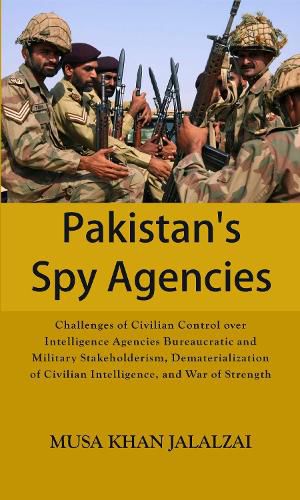Readings Newsletter
Become a Readings Member to make your shopping experience even easier.
Sign in or sign up for free!
You’re not far away from qualifying for FREE standard shipping within Australia
You’ve qualified for FREE standard shipping within Australia
The cart is loading…






This title is printed to order. This book may have been self-published. If so, we cannot guarantee the quality of the content. In the main most books will have gone through the editing process however some may not. We therefore suggest that you be aware of this before ordering this book. If in doubt check either the author or publisher’s details as we are unable to accept any returns unless they are faulty. Please contact us if you have any questions.
The imbalance of Pakistan’s civil-military relations has caused misperceptions about the changing role of intelligence in politics. The country maintains 32 secret agencies working under different democratic, political and military stakeholders who use them for their own interests.
Established in 1948, The ISI was tasked with acquiring intelligence of strategic interests and assessing the intensity of foreign threats, but political and military stakeholders used the agency adversely and painted a consternating picture of its working environment. The civilian intelligence agency-Intelligence Bureau (IB) has been gradually neglected due to the consecutive military rule and weak democratic governments. The ISI today seems the most powerful agency and controls the policy decisions. The working of various intelligence agencies, militarisation of intelligence and ineffectiveness of the civilian intelligence are some of the issues discussed in the book.
$9.00 standard shipping within Australia
FREE standard shipping within Australia for orders over $100.00
Express & International shipping calculated at checkout
This title is printed to order. This book may have been self-published. If so, we cannot guarantee the quality of the content. In the main most books will have gone through the editing process however some may not. We therefore suggest that you be aware of this before ordering this book. If in doubt check either the author or publisher’s details as we are unable to accept any returns unless they are faulty. Please contact us if you have any questions.
The imbalance of Pakistan’s civil-military relations has caused misperceptions about the changing role of intelligence in politics. The country maintains 32 secret agencies working under different democratic, political and military stakeholders who use them for their own interests.
Established in 1948, The ISI was tasked with acquiring intelligence of strategic interests and assessing the intensity of foreign threats, but political and military stakeholders used the agency adversely and painted a consternating picture of its working environment. The civilian intelligence agency-Intelligence Bureau (IB) has been gradually neglected due to the consecutive military rule and weak democratic governments. The ISI today seems the most powerful agency and controls the policy decisions. The working of various intelligence agencies, militarisation of intelligence and ineffectiveness of the civilian intelligence are some of the issues discussed in the book.